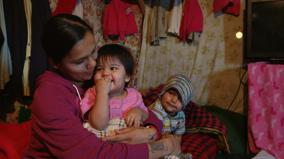Kímmapiiyipitssini: The Meaning of Empathy
2021
2 h 4 min
Coming soon
Follow filmmaker Elle-Máijá Tailfeathers as she creates an intimate portrait of her community and the impacts of the substance use and overdose epidemic. Witness the change brought by community members with substance-use disorder, first responders and medical professionals as they strive for harm reduction in the Kainai First Nation.

Extras
Details
Follow filmmaker Elle-Máijá Tailfeathers as she creates an intimate portrait of her community and the impacts of the substance use and overdose epidemic. Witness the change brought by community members with substance-use disorder, first responders and medical professionals as they strive for harm reduction in the Kainai First Nation.
-
writerElle-Máijá Tailfeathers
-
directorElle-Máijá Tailfeathers
-
producerElle-Máijá TailfeathersDavid Christensenlori lozinski
-
executive producerDavid Christensen
-
director of photographyPatrick McLaughlin
-
editorHans Olson
-
composerChandra Melting Tallow
-
animation illustratorKarlene Harvey
-
animatorAparna Kapur
-
production supervisorEsther Viragh
-
studio administratorDevon SupeeneBree Beach
-
studio operations managerDarin Clausen
-
production coordinatorJessica SmithHilda AmponsahTanis RedcrowFaye Yoneda
-
marketing managerKay Rondonneau
-
publicistKatja De Bock
-
legal counselChristian Pitchen
-
participantDr. Esther TailfeathersKirby ManyfingersTim TailfeathersDarwin FisherLynda LaPretreTyler BigchildMichelle WishartDr. Christy SutherlandTod SpencerPam Little BearLori Eagle PlumeMelanie Old ShoesMariah ShoutingKenneth WoodSonjae Bare Shin BoneLeah CrazybullGeorge Calling LastMaggie KronenMike FoxStephanie Brown WeaselDallas HindbullRobyn Fox-OkaRobert CalfSean Chief MoonBryan SmithKy Bird-ShoutingJeremy Weasel MoccasinRoxi White QuillsChief Roy FoxShae Standing AloneKalon Sharp AdzeGeraldine ShadeNolan Little BearRady GoodriderStacey BourqueLloyd Chief CalfTravis BirdMark Brave RockGina HuntSylvester "Sly" DanielsMarcia White QuillsLynda Eagle SpeakerKevin CowanJacen AbreyLani BlackwaterTrinity White FeathersSergeant John ConnorVirginia TailfeathersLester TailfeathersEline Van MuntLeslie WellsKara Eagle BearWarren PottsRylanJeff FoxChantelle VailleresLeonard Chief MoonAustin TallmanJagger Eagle PlumeJudy SeptTyler Chief CalfLorne TaylorBaby Boy
-
additional photographyDamien Eagle BearJoshua ManyheadsSoloman ChiniquayArnell TailfeathersElle-Máijá Tailfeathers
-
sound recordistBrad MartinAlex MitchellCharlene MooreRon OsiowyArnell TailfeathersElle-Máijá TailfeathersJeff HenschelFrancesco Russo
-
production assistantLeonard ProvostArnell TailfeathersMadison TailfeathersDeserae Yellow Horn
-
location managerLeonard ProvostArnell Tailfeathers
-
production stills photographerArnell Tailfeathers
-
impact producerRobyn Weasel Bear
-
directing and producing menteeJade BaxterOlivia Marie BrooksTristin Greyeyes
-
elderFrancis First ChargerBeverly Hungry Wolf
-
cultural supportFrancis First ChargerBeverly Hungry Wolf
-
indigenous history and policy workshop facilitatorFaye Morning Bull
-
first assistant editorKrystal Moss
-
colourist - mentorSam Gilling
-
colourist menteeSoloman Chiniquay
-
titlesCheyenne Manning
-
graphic designerCheyenne Manning
-
on-screen graphicsAsia Youngman
-
sound designerPeter Robinson
-
sound designer - mentorEva Madden
-
dialogue editorPeter Robinson
-
additional supervising sound editorDavid Green
-
ADR recordistPeter Robinson
-
sound mix facilitySharpe Studios
-
project managerLaurie Melhus
-
sound supervisorKelly Cole
-
re-recording mixerMay GuimaraesKevin Morales
-
post-production facilityElemental Post
-
project supervisorMatt Drake
-
finishing artistRyan Mance
-
legal servicesNathaniel Lyman
-
audit servicesGemma Davis
-
interim financingNational Bank of Canada
-
insuranceFront Row Insurance Brokers Inc.
-
post-production accountingParalee Cook


















